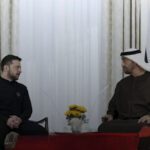As the Russia-Ukraine war enters another year with no clear resolution, diplomatic efforts to broker peace have intensified. While the conflict has primarily been shaped by military engagements and geopolitical maneuvering between Kyiv, Moscow, Washington, and Brussels, a new player has emerged as an increasingly pivotal mediator: the United Arab Emirates (UAE). Once seen as a regional powerhouse with economic ambitions, the UAE is now positioning itself as a significant diplomatic force, facilitating high-level negotiations that could determine the trajectory of one of the most consequential conflicts of the 21st century.
Behind the Scenes of Diplomacy
Recent developments indicate that diplomatic engagements between Russia and the United States have taken place in Riyadh, Saudi Arabia—a venue chosen due to its neutral stance and ability to facilitate high-stakes discussions without excessive Western influence. The talks, led by U.S. Secretary of State Marco Rubio and Russian Foreign Minister Sergei Lavrov, reportedly focused on potential confidence-building measures such as reopening diplomatic missions and establishing dedicated peace teams for Ukraine.
However, the absence of Ukrainian officials in these discussions raised concerns in Kyiv and among European allies, who feared that negotiations without Ukraine’s involvement might undermine its sovereignty. President Volodymyr Zelenskyy swiftly responded by strengthening diplomatic ties with another influential Gulf nation: the UAE.
Zelenskyy’s Strategic Visit to the UAE
Amid growing discussions about peace talks in which Ukraine was seemingly excluded, President Zelenskyy made an official visit to Abu Dhabi, where he met with UAE President Mohamed bin Zayed Al Nahyan. The meeting underscored Ukraine’s determination to be an active participant in any resolution process and to leverage the UAE’s growing clout in global diplomacy.
During his visit, Zelenskyy engaged in economic discussions, securing agreements on humanitarian aid, post-war reconstruction projects, and bilateral trade expansion. More importantly, he sought assurances that the UAE would advocate for Ukraine’s direct involvement in any future peace talks. The UAE, having previously played an instrumental role in facilitating prisoner exchanges between Russia and Ukraine, expressed its willingness to support a diplomatic framework that would be inclusive and fair to all parties involved.
The UAE’s Unique Position
The UAE’s growing diplomatic influence is not coincidental. As a country that maintains strong economic ties with both the West and Russia, it has managed to navigate the complexities of international geopolitics with remarkable dexterity. While Western nations have imposed heavy sanctions on Moscow, the UAE has continued engaging with Russia, particularly in the areas of trade and investment. This balancing act has made it one of the few countries with the credibility to speak to both sides without being perceived as overtly biased.
Additionally, the UAE’s involvement in Russia-Ukraine negotiations aligns with its broader foreign policy objectives. Over the past decade, it has sought to expand its role as a global mediator, resolving conflicts in the Middle East and beyond. By positioning itself as a neutral facilitator, the UAE has enhanced its reputation as a nation that prioritizes stability, economic cooperation, and pragmatic diplomacy over ideological alignments.
Saudi Arabia and the UAE: A Dual Approach
While Saudi Arabia has taken the lead in hosting direct U.S.-Russia talks, the UAE has complemented these efforts by engaging directly with Ukraine and providing alternative channels for dialogue. This dual approach reflects a broader Gulf strategy of leveraging diplomatic neutrality to serve as a bridge between conflicting parties.
Saudi Arabia’s willingness to host discussions involving U.S. and Russian officials suggests that Riyadh sees itself as a key broker in global affairs. Meanwhile, the UAE’s role in supporting Ukraine’s inclusion ensures that negotiations do not become a unilateral affair dictated by major powers without considering the interests of the affected nation. The two Gulf states, often viewed as rivals in economic and geopolitical influence, appear to be working in tandem to cement their roles as indispensable diplomatic players.
European Concerns and NATO’s Stance
Despite these diplomatic advances, the exclusion of European nations from initial peace discussions has triggered concerns in Brussels. French President Emmanuel Macron reportedly held emergency meetings with European Union leaders to emphasize the need for Europe to have a seat at the table.
NATO Secretary General Mark Rutte also weighed in, stressing that while American leadership in the peace process was essential, European nations needed to be proactive rather than reactive.
“We cannot afford to be bystanders,” Rutte remarked during a press briefing. “If there is a roadmap for peace in Ukraine, Europe must be a co-author, not just a spectator.”
The tensions surrounding these diplomatic talks reflect the broader anxieties of European nations, which fear that a peace deal formulated without their input could have long-term consequences for regional security.
The Future of UAE Mediation
As peace negotiations evolve, the UAE is poised to play a critical role in shaping the diplomatic landscape. Its ability to engage both Kyiv and Moscow, while maintaining strong ties with Washington and Brussels, makes it uniquely positioned to facilitate meaningful dialogue. Whether through backchannel negotiations or direct peace summits, Abu Dhabi’s involvement will likely grow in prominence in the coming months.
Moreover, the UAE’s mediation efforts extend beyond political negotiations. The country is actively involved in humanitarian initiatives, providing aid to Ukrainian civilians displaced by the war. It has also pledged financial assistance for post-war reconstruction, further demonstrating its commitment to fostering long-term stability rather than just short-term diplomatic wins.
A Defining Moment for Gulf Diplomacy
The Russia-Ukraine war has reshaped global alliances and forced nations to reconsider their diplomatic strategies. In this evolving geopolitical landscape, the UAE has emerged as more than just an economic powerhouse—it is now a key player in high-stakes diplomacy. By balancing relationships with global superpowers and advocating for a fair negotiation process, the UAE is demonstrating that it has the credibility and influence necessary to help steer the world toward a resolution.
While challenges remain—particularly regarding the inclusion of Ukraine and European nations in negotiations—the UAE’s engagement signals a broader shift in international diplomacy. No longer confined to regional affairs, Gulf nations are asserting themselves as indispensable mediators in global conflicts. As the world watches the unfolding peace process, the role of the UAE in shaping the future of Ukraine remains one of the most significant diplomatic developments of our time.

















